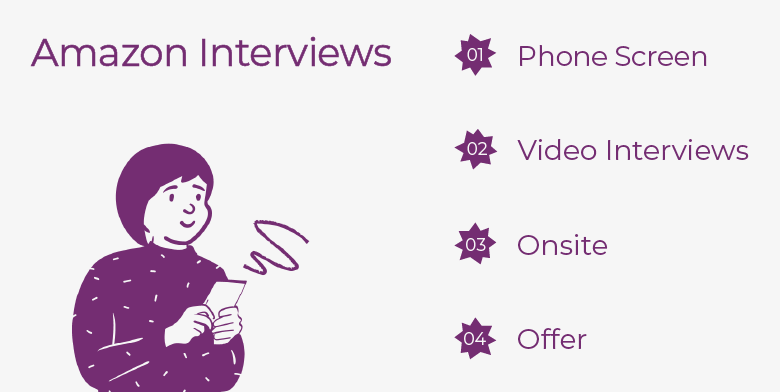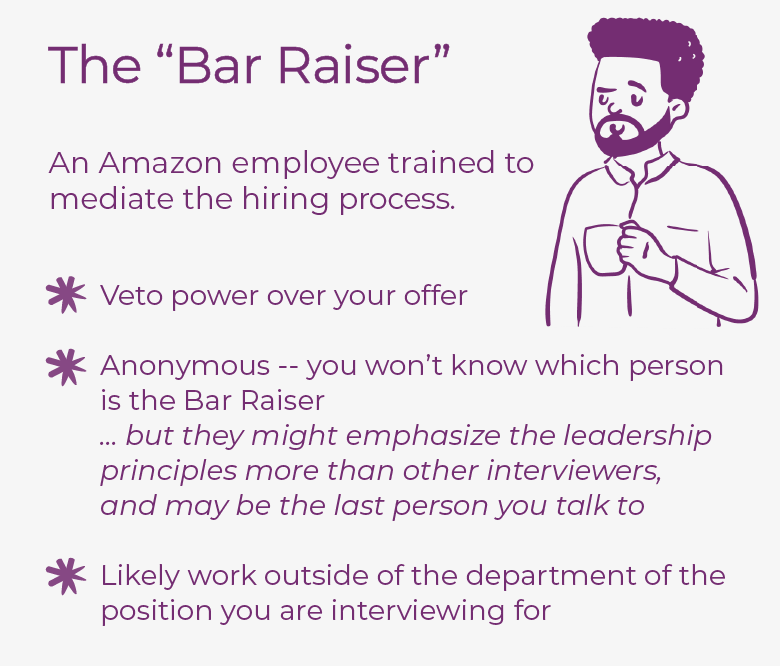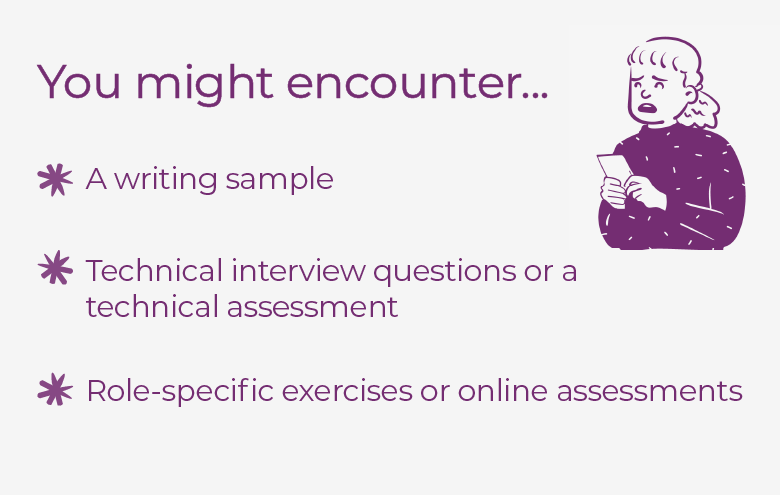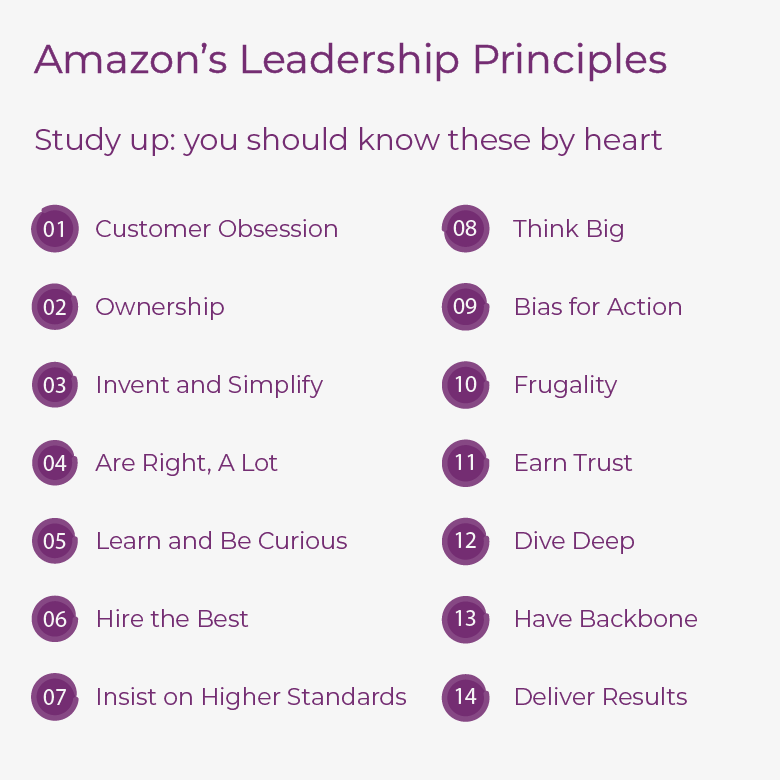Acing the Amazon Interview Process: From A to Z
Interviewing at this self-proclaimed "peculiar company" is a little different from the usual. Here's what to expect.

As you'd expect from a trillion-dollar company, Amazon has a rigorous and unique recruiting process. Like many large tech companies, they don't put much stock in cover letters — which means your resume must stand on its own.
Like Zappos and Airbnb, Amazon bases its hiring decisions on culture fit as much as a candidate’s qualifications. The term ‘culture fit’ has courted bad press for eroding workplace diversity, but at Amazon it simply refers to a set of leadership principles that guide the company’s mission. "Customer obsession" is at the heart of it.
The hiring process can be broken down into 5 steps, and reportedly ranges from one week to four months, depending on the role and team. Depending on the role you’re interviewing for, you may be required to take a technical or non-technical assessment, answer behavioral questions, or even complete a writing sample.
Amazon’s Four-Step Interview Process

A recruiter will reach out via email or LinkedIn
Many Amazon hires are headhunted, meaning a recruiter sources candidates via LinkedIn and invites them to apply — usually to one specific role. Whether you applied online or were “discovered”, a recruiter will contact you to set up a 15-30 minute phone screen. At this point, they'll ask for your resume, so have one prepared.
👉 Which resume outline should you use? Find out here.
1. Phone Screen
Like any standard phone screen, the recruiter will assess your interest in and fit for the role. They will also ask basic questions about your background, such as:
They may also ask about salary expectations. Our advice is to defer this conversation to the end — read our guide on salary negotiation for the right language to use.
2. Video Interviews
If you pass the phone screen, you’ll be invited to do subsequent video screens. These may involve a hiring manager or a peer of the same level as your role, who will ask more in-depth questions about your resume, as well as behavior-based questions, such as:
For a software engineering role, be prepared to answer technical questions about algorithms, data structures and coding. Have a notebook, pen and laptop ready as you may be required to code on the fly.
For a product manager role, expect to work on a case and answer strategy questions.
This specialization applies to other roles too. Operations roles usually involve a deeper discussion of your resume. Designers should expect to go through your portfolio.
Depending on the role, you may be asked to provide or discuss examples of past work. If possible, hyperlink these samples in your resume (if you code, make sure your GitHub portfolio is ready for prime time).
👉 Do you think you'd fit into Amazon's culture? Find out here.
3. Onsite interviews

Amazon’s onsite interviews are known as a “Loop” where you spend an entire day with 4-6 current staffers at its Seattle headquarters. Due to current COVID-19 stay-at-home orders, all interviews are being conducted virtually. Your interviewers may comprise senior members on your team, a prospective teammate, someone from the hiring team, and what’s called a “bar raiser.”
A bar raiser is an Amazon employee trained to be an interview expert. They serve as an objective mediator for hiring decisions outside their department to ensure a fair decision-making process. Their job is to determine whether or not you would “raise the bar” on performance or simply perpetuate the status quo -- a concept borrowed from Microsoft’s hiring methods.
You may not know who the bar raiser is, however, one important clue is they will emphasize questions regarding Amazon’s leadership principles. They are also typically the last person you interview with onsite.
The bar raiser will pay special attention to the following:
- What questions is the candidate asking?
- Do they see the bigger picture of their role or the product they’ll be working on?
- Do they care about how their role impacts the company?
- Do they show empathy for the user?
4. Offer or no offer
Behind the scenes, a hiring committee decides on offer or no offer, and also collectively sets your level (which dictates your salary range). A hiring manager will then usually follow up by phone within two days to one week to let you know the outcome.
If Amazon does make you an offer, the recruiter will discuss the terms with you (salary, work location, hours, etc.). If you choose to negotiate (and you should!), any adjustments would be approved by a separate compensation committee. If everything is cleared, the recruiter will send over the necessary paperwork.
👉 What benefits can you expect once you get there? Find out here.
Other Potential Interview Assessments

Completing a writing sample
Amazon eschews PowerPoint and other slide-deck type presentations, so writing skills are paramount even for a software engineering role. When presenting new ideas, employees are required to write a press release-style memo presented to all team members at the start of the meeting for 20 minutes of silent reading, followed by Q&A with the writer.
Technical interview questions or a technical assessment
This is to be expected for software engineering and other technical roles (which require preparation) but may also be administered for other applicants as well (no prep is required; you simply answer the questions as honestly as you can).
Role-specific exercises or online assessments
Some teams at Amazon incorporate these into the interview process. These assessments are either work-style assessments (select statements that are most compatible with your work style) or work sample assessments (complete virtual tasks such as answering a customer question, interpreting data from a chart or choose how to resolve an issue).
Amazon-Specific Interview Procedures

Answering behavioral interview questions using the STAR method
The STAR (Situation, Task, Action, Result) method is relatively common, but Amazon places extra emphasis on it. Amazon advises candidates to research typical behavioral interview questions and come prepared with five stories to share. For best results, they recommend framing your responses using the STAR method.
- Situation: Describe the situation you were in or the task you had to accomplish.
- Task: What goal were you working toward?
- Action: Describe the actions you took to address the situation.
- Result: Explain the outcome of your actions.
Know Amazon’s leadership principles inside and out
In addition to sizing up your technical skills, recruiters will gauge the extent to which you identify with Amazon’s leadership principles. The top two are customer obsession (putting the user first) and ownership (being invested in the mission and bigger picture). Regardless of your position in the hierarchy, you’ll be expected to demonstrate these leadership traits.
Be prepared to wow the “bar raiser”
The bar raiser has veto power over your hiring; even a hiring manager can’t override their final verdict. Before your onsite interview, get familiar with a bar raiser’s role and what they’re looking for.
Interview Questions You Should Prepare For
Sample behavioral questions...
- Tell me about a time when you were faced with a problem that had a number of possible solutions.
- When did you take a risk, make a mistake, or fail? How did you respond, and how did you grow from that experience?
- Describe a time you took the lead on a project.
- What did you do when you needed to motivate a group of individuals or promote collaboration on a particular project?
- How have you leveraged data to develop a strategy?
- Tell me a challenge you had where the best way forward was not clear-cut. How did you decide what to do?
- Give me an example of something you tried to accomplish but failed.
- Give me an example of a time when you showed initiative.
- Tell me about a time when you delegated a project effectively.
- Tell me about a time when you coached someone.
- When have you used your fact-finding skills to solve a problem?
👉 View and practice recent interview questions with Candor. Follow this link
Sample technical questions for software engineering and product management roles...
- If you were tasked with changing the Amazon Fresh experience, what would you do and how would you measure it?
- What metrics do you use to drive change?
- Tell me about a feature or customer experience that had multiple issues.
- Jeff Bezos walks into your office and says you can have a million dollars to launch your best entrepreneurial idea. What is it?
- How do you form positive relationships with developers and/or stakeholders?
- Given a dictionary of words, find words that are compound words made from other words in the dictionary.
- What was a time where you were unable to complete a project/assignment due to time constraints, and how did you deal with it?
- How do you make use of existing resources to improve performance?
- Perform a depth-first search on a binary tree.
- Describe a situation where you failed your manager.
- How would you implement a word auto-complete feature? Assume you are given the list of words to be completed and the word to be searched (always starting from its first letter).
👉 View and practice recent interview questions with Candor. Follow this link
Sample questions for area manager/project manager roles...
- Amazon is a peculiar company. What is peculiar about you?
- Would you oppose a supervisor who made a decision that goes against corporate policy and is a potential safety issue for one of your employees?
- Tell me about a time you had to overstep management to get your point of view across.
- Tell me about a time when you were leading a group, were assigned a goal, and did not reach it.
- Tell me about a time when you had a group conflict; how did you overcome this conflict?
- How did your actions in a leadership role increase productivity?
- Tell me about a time when you dealt with an employee with poor performance.
- What is your take on leadership?
- What kinds of roles have you had that were leadership roles?
👉 View and practice recent interview questions with Candor. Follow this link
The information provided herein is for general informational purposes only and is not intended to provide tax, legal, or investment advice and should not be construed as an offer to sell, a solicitation of an offer to buy, or a recommendation of any security by Candor, its employees and affiliates, or any third-party. Any expressions of opinion or assumptions are for illustrative purposes only and are subject to change without notice. Past performance is not a guarantee of future results and the opinions presented herein should not be viewed as an indicator of future performance. Investing in securities involves risk. Loss of principal is possible.
Third-party data has been obtained from sources we believe to be reliable; however, its accuracy, completeness, or reliability cannot be guaranteed. Candor does not receive compensation to promote or discuss any particular Company; however, Candor, its employees and affiliates, and/or its clients may hold positions in securities of the Companies discussed.
